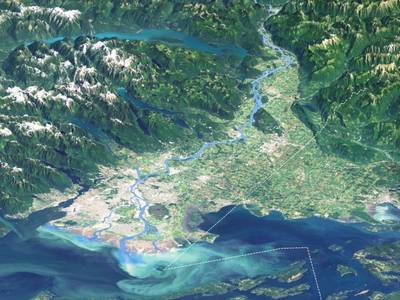West Coast is Key for Exporting Bigger Canada Crops
Canada needs to invest in shipping more grains and oilseeds off the West Coast as harvests get larger, to avoid the massive transportation backlogs that followed last year's record crops, industry officials said on Wednesday.
Last year, 19.3 million metric tons of grain moved in bulk and containers combined through Port Metro Vancouver, British Columbia, the country's biggest port, which connects Canadian commodities with Asian buyers, according to the port.
But handling Canadian commodity volumes that are trending higher will require greater spending on infrastructure to move the goods to the West Coast, some say.
"The demand and pinch point for us as a country really does exist on the West Coast," said Jeff Vassart, president of Cargill Ltd, the Canadian division of the global agribusiness giant. "That's where we see demand increasing into the future"
Vassart, speaking at the Canadian Global Crops Symposium in Winnipeg, also said he expects grain companies to continue spending to make country elevators more efficient.
Canada relies on railways to move wheat, canola and other crops vast distances from western provinces to ports on the Pacific Ocean, Great Lakes and St. Lawrence Seaway. Last year's record-large 76-million-metric-ton Western-Canada harvest, followed by a frigid winter, have overwhelmed Canadian National Railway Co and Canadian Pacific Railway Ltd, backing up the flow of millions of tonnes of grain.
Cargill is spending C$50 million ($45 million) over several years to move grain faster and more efficiently through Vancouver. The two biggest Canadian grain handlers, Richardson International and Viterra, have announced plans to expand capacity at the port.
More can be done, said Jean-Jacques Ruest, chief marketing officer of Canadian National Railway.
"There are still places you can put brand new elevators" at Port Metro Vancouver, Ruest said at the symposium. With larger crops, exporters will also have to maximize use of smaller ports at Prince Rupert, British Columbia and Thunder Bay, Ontario, Ruest said.
Improving seed varieties and better farming practices are pushing yields higher, although last year's unprecedented harvest was also due to nearly ideal weather in Western Canada.
More grain terminal space and efficiency improvements are needed at Vancouver, although the public is voicing more concerns than before about such expansions, said Chris Wellstood, Port Metro Vancouver's director of marine operations and harbor master.
($1=$1.10 Canadian)
(Reporting by Rod Nickel in Winnipeg, Manitoba; Editing by Alden Bentley)












